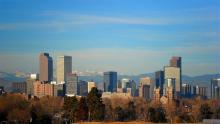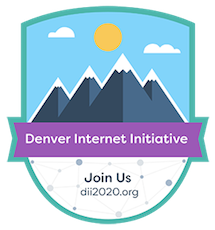
Fast, affordable Internet access for all.

Even though there are more than 140 municipalities and counties that have voted to reclaim local telecommunications authority from the state, the City and County of Denver, Colorado, has put off such a referendum. 2020, however, may be the year that the metropolitan region votes to shed themselves of the harmful restrictions of SB 152.
Councilman Paul Kashmann announced earlier this month that he supports the city taking the question to the voters, like so many other local leaders have already done in Colorado. He suggests putting it on the 2020 ballot. At a policy committee on October 9th, Kashmann told his colleagues:
“Make no mistake that the Internet is much more than Netflix and Facebook and Twitter and Minecraft and the like,” Kashmann said. “The Internet is truly … the library of the 21st century. It’s the entry point into the world of information in the same way as our traditional brick-and-mortar libraries have been for centuries.”
 Comcast and Centurylink provide Internet access to the community of around 620,000 people. Even though the large corporate providers tend to concentrate their investments in urban areas like Denver, the issue of affordability still keeps many urban dwellers on the wrong side of the digital divide.
Comcast and Centurylink provide Internet access to the community of around 620,000 people. Even though the large corporate providers tend to concentrate their investments in urban areas like Denver, the issue of affordability still keeps many urban dwellers on the wrong side of the digital divide.
The Denver Public Library lends out between 115 - 120 mobile hotspots and the wait list can extend as long as 200 names at a time. Libraries from which the hotspots are most often borrowed tend to be in areas where fewer people have home Internet access. The library estimates that approximately 20 percent of the city’s residents aren’t connecting at home.
Kashmann stated that he’s anticipating pushback from incumbent Internet access providers. He looks on the measure as in the same light as any other necessary utility:
“Try to imagine if you needed a drink of water and you had to go to the library to get that drink of water, or if the speed at which it came out of the faucet you have at home has to do with how much you pay,” Kashmann said.
Just the Beginning
As with all SB 152 opt-out ballot initiatives, if the city council decides to present the matter to the voters and it passes, the city won’t automatically shift into "municipal network mode." Reclaiming local telecommunications through the referendum is only the first of a multi-step process and creates no commitment to move ahead. A majority of municipalities and counties in Colorado that have passed the referendum have made no further plans yet to deploy community networks. Many have opted out primarily because they feel that they should have the authority to deploy such networks at the local level, unfettered by state laws.
From Brandy DeLange of the Colorado Municipal League:
"A 152 [ballot initiative] is the starting point. It is square one for a local government to really explore anything that has to do with broadband. It doesn’t necessarily mean that a municipal government is providing broadband."
Grassroots in Denver
 The Denver Internet Initiative is a local group of tech-minded residents driving for change. They’re assembling information to share with locals about the SB 152 referendum and municipal networks. They spoke with Westword: "I think that our youth should have equal access to the Internet," says Cory Trimm, a Denver tech professional who has been pushing for a municipal broadband ballot initiative for over a year.
The Denver Internet Initiative is a local group of tech-minded residents driving for change. They’re assembling information to share with locals about the SB 152 referendum and municipal networks. They spoke with Westword: "I think that our youth should have equal access to the Internet," says Cory Trimm, a Denver tech professional who has been pushing for a municipal broadband ballot initiative for over a year.
At the city council meeting on October 9th, Council Member Amanda Sandoval described how a group project at her son’s school suffered because one of the students on the team had no access to Internet service at home. “My son had a science project and my son was failing in science because his friend couldn’t do his part of the work on the weekend,” Sandoval said. “It’s not equitable for some kids not to have Internet.”
"It’s a crime that wealthy kids have high-speed Internet and poor kids may not," Kashmann said.
At least four of the council’s 13 members expressed early support for the idea of bringing the opt-out measure to the voters in 2020.
Image of Denver by Hogs555 [CC BY-SA 3.0]
